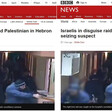Activism and BDS Beat 23 March 2015

An Israeli tourism brochure circulated by Waitrose.
The deluge of Facebook and Twitter messages directed at Waitrose, criticizing its distribution of a brochure titled Taste of Israel in February, has also attracted attention from the mainstream media in the last two weeks, adding to the supermarket’s PR woes.
And the brochure itself has been the subject of a complaint to Britain’s Advertising Standards Authority, by the Palestine Solidarity Campaign (PSC), on the grounds of false advertising.
In its letter to the advertising watchdog, the PSC cited the brochure’s references to Jerusalem and the Golan Heights as being in Israel, and the listing of Palestinian and Arab foods, such as tahini and zaatar, as being Israeli.
The brochure, which promotes Israel as a travel destination, is a mix of recipes, wine recommendations and descriptions of tourist towns in Israel.
Waitrose initially ignored emails it received at the end of February and early March asking why it had accepted money from the Israeli Government Tourist Office — which produced Taste of Israel — to distribute the brochure as a supplement in its in-house magazine, Kitchen.
Many of those who wrote forwarded their emails to the PSC, and said they had received no reply. The PSC encouraged them to approach Waitrose by posting on the store’s Facebook page and via Twitter.
One of those who posted on the Waitrose Facebook page was Ayman Abuawwad, a Palestinian living in London.
Abuawwad wrote: “I am a Palestinian from Gaza. How dare Waitrose promote the theft of my Palestinian heritage, my culture, my food and call it Israeli … Shame on you Waitrose for canceling a whole nation, a whole culture for profit.”
“Side order of apartheid”
It was when Waitrose deleted Abuawwad’s post and then blocked him from posting on its page again — a ban which was publicized by the PSC — that the steady stream of critical social media comments became a flood.
The novelist and commentator Ahdaf Soueif was among the many hundreds who took over Waitrose’s Facebook page on the day Abuawwad’s ban became public. She referred to how Waitrose is part of the John Lewis Partnership, an employee-owned firm.
She wrote: “Dear Waitrose, I have been your loyal and even loving customer for thirty years. Partly because I like the John Lewis ethic. But this ethic does not square with your recent attitude re. Palestine. It’s all very well to make a mistake, but to insist on it is wrong and not worthy of you. Please give us a sign that you are the fair and ethical organization we thought you were.”
Many, many others who posted or tweeted said they would be boycotting the store. Still others copied and posted Abuawwad’s original comment — which the PSC had made available on its website — and dared Waitrose to ban them too.
The story hit mainstream UK newspapers the same day, with a headline in Metro proclaiming: “Waitrose is getting a battering over running a ‘Taste of Israel’ advert.”
The article included photos of a devastated Gaza following last summer’s Israeli massacre and embedded tweets into the text, including one which jibed that there was ”nothing like the taste of falafel, with a side order of apartheid.”
Other newspapers and websites followed, including the The Independent, The Daily Mail, The Huffington Post and two trade magazines aimed at PR professionals, Campaign and Media Week.
All embedded tweets critical of Waitrose and the Taste of Israel supplement into their articles, and included some, or all, of this quotation taken from the PSC’s website: “The booklet is a prime example of Israeli government propaganda, highlighting its efforts to distract the public abroad from its brutal military occupation of Palestinian land by replacing the image of an apartheid regime with that of a tourist-friendly, culture-loving country.”
“It is also a shocking example of the Israeli appropriation of Palestinian culture – in this case, food – in an attempt to erase the memory of Palestine from the land and replace it with Israel.”
Burying head in sand
Waitrose responded by burying its head in the sand. Instead of engaging with its detractors on social media, the supermarket chain hit out by deleting many critical comments on its Facebook page and blocking commentators, including me, on both Facebook and Twitter.
Commenting underneath a Waitrose-related post on the PSC’s Facebook page, Christina Murphy wrote: “Last time I looked there were tons of compIaints on their FB page. Now, they’ve all been removed. They seem to think that if they close their eyes and press delete, it will all go away. Well, it won’t. Waitrose have handled this very poorIy. If they had responded to intial emails, this would have been a minor matter. Now it’s reached the mainstream press and the row shows no sign of abating. They brought this entireIy on themselves.”
The John Lewis Partnership is no stranger to controversy when it comes to the Israeli occupation of Palestinian land.
The flagship John Lewis store in London’s Oxford Street was the site of fortnightly protests organised by the PSC and the London BDS Group during 2014 because it sold SodaStream’s machines for making fizzy drinks — products manufactured in SodaStream’s factory in Maale Adumim, an Israeli settlement in the occupied West Bank.
Regional campaigns targeted other John Lewis stores around the country and, at the beginning of July 2014, John Lewis took SodaStream products off all its shelves, including in its London store.
However, then, as now, the John Lewis Partnership refused to engage with pro-Palestinian activists, despite direct approaches from the PSC.
Last week, Sarah Colborne, director of the PSC, wrote to Mark Price, the managing director of Waitrose, offering a meeting to discuss the Taste of Israel debacle.
The letter brought Price’s attention to Israel’s slaughter of more than 2,200 Palestinians in Gaza, including 504 children, over fifty days last summer. It highlighted Israel’s brutal military occupation of the West Bank — including East Jerusalem — and Gaza. And it reminded Waitrose that the blockade of Gaza denies adequate food, medical, water and fuel supplies to a civilian population of 1.8 million people.
Colborne wrote: “Given this, we cannot see how your promotion of Israel, for which you would have been paid by the Israeli state tourist office, squares with your proclaimed ethical values and your support for the Fairtrade Foundation.”
Colborne has yet to hear back from Price and it remains to be seen whether the John Lewis Partnership will, on this occasion, engage positively with an organization which calls for the upholding of Palestinian human rights and respect for international law.
But two things are certain. The John Lewis brand has suffered from its promotion of Israel and its subsequent disastrous handling of the row which ensued. And other companies will surely have taken note of what could happen should they choose to participate in the promotion of a state which imposes occupation, apartheid and siege on the Palestinian people.
Tags
- Waitrose
- Mark Price
- Sarah Colborne
- Palestine Solidarity Campaign
- John Lewis
- Sodastream
- Advertising Standards Authority
- Israeli Government Tourism Office
- Ayman Abuawwad
- london
- Gaza
- #GazaUnderAttack
- apartheid
- Ahdaf Soueif
- Metro
- The Independent
- The Daily Mail
- The Huffington Post
- campaign
- Media Week
- West Bank
- Jerusalem
- East Jerusalem
- Israeli settlements
- Gaza siege
- Fairtrade Foundation
- Maale Adumim






Comments
Tweet @waitrose
Permalink Ayman Abuawwad replied on
I managed to take snapshoots of my post on Waitrose's Facebook Page before they deleted it and blocked me. I tweeted it at them. Find it here: https://twitter.com/al_jiyya/s...
Waitrose
Permalink Reg Vernon replied on
I predict that Waitrose's profits will not be harmed by the furore caused by the Taste of Israel supplement.
Israelis share the cultural traditions of their countries of origin. This means that Arab cuisine is as much part of Israeli food culture as gefilte fish and chicken noodle soup. Don't forget that many Israelis were once Syrians, Lebanese, Iraqis, Persian, Yemeni etc. They are as entitled to own their food traditions as are Palestinians. It is a shared heritage, not an exclusive one.
a hallmark of Israeli culture
Permalink tom hall replied on
It is a shared heritage, not an exclusive one.
The same can be said of apartheid.
Waitrose
Permalink Reg Vernon replied on
The complaint was that Waitrose were endorsing a misappropriation of Palestinian food culture. I showed that it was nothing of the kind because Israeli food culture derives from the cultural origins of Israelis.
I don't accept your view that the shared experience of food culture in any way equates to apartheid. You are making a false argument.
The Arab List has just won something like 15 seats in the Knesset. That's apartheid?
a heritage unequally shared
Permalink tom hall replied on
Oppressors and oppressed have a mutual history. And despite separation walls, checkpoints, a discriminatory legal system, land confiscation, denial of basic rights, military occupation, mass murder and wholesale expulsion, even including the cultural absorption and erasure of that former presence, the relationship between ruler and ruled is an uncomfortably intimate one. To speak in a facile way of "shared heritage" raises the question of what heritage really means. In the case of Israel/Palestine, it means longstanding, systematic and violent inequality. The ongoing effort of Zionists to displace and supplant the native population has a cultural dimension which finds expression in such public relations tactics as Waitrose's advertising insert. The setting for such bland assertions of a "shared heritage" is one of stark institutional racism and oppression. The word for such a system is apartheid. Israeli cultural claims can't be honestly assessed while failing to acknowledge this truth. Describing elements of traditional Palestinian cuisine as Israeli is akin to claiming Palestinian land as your own, through an ostensibly benign act of absorption. Your exclusive claim becomes part of a "shared heritage", along with every privilege for yourself and every misfortune for your adversaries.
As for the recent election result, drawing attention to the gains made by the Arab List hardly absolves the state of its racist character. In fact, the heightened Israeli Arab turnout was due to the menacing character of recent events and policies. The same sort of spurious argument is employed by Zionists who insist that increases in the Palestinian Arab population prove no genocidal factor is at work, when the project of Jewish nationalism is predicated on the removal of as many non-Jews as possible.
Waitrose and Israeli food
Permalink Phil Gibbons replied on
Israel can't have it both ways. It is either conducting an illegal takeover of Palestine with its illegal occupation of the West Bank, which contravenes numerous UN Resolutions or they have incorporated the West Bank (they call it Judea and Samaria) in which case Israel is an apartheid state as Jews have all privileges and Palestinians in the West Bank have none. Even Nelson Mandela said that the apartheid in Palestine is far worse than the apartheid was in South Africa.
Jews from anywhere on earth can be citizens of that horrible country but Palestinians born there with deeds to the land cannot even live there. The Israeli State has its own Nuremberg laws and bans marriage between Jews and Non-Jews. This abomination needs to be boycotted, disinvested, sanctined and blockaded by the rest of the world until it becomes a democracy with equal riights for all and one vote for each and every man and woman on the land.
waitrose and Israel/Palestinr
Permalink frances stabfield replied on
My initial letter - as a loyal John Lewis partnership cardholder- about soda stream got a patronising, dismissive response, but after a few months JL did the right thing. Pressure must be maintained. The Boycott, Divestment and Sanctions movement is growing. I certainly am not inclined to promote the brand anymore.